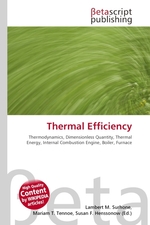Thermal Efficiency
Lambert M. Surhone, Miriam T. Timpledon, Susan F. Marseken
бумажная книга
High Quality Content by WIKIPEDIA articles! In thermodynamics, the thermal efficiency (eta_{th} ,) is a dimensionless performance measure of a device that uses thermal energy, such as an internal combustion engine, a boiler, a furnace, or a refrigerator for example. The input, Q_{in} ,, to the device is heat, or the heat-content of a fuel that is consumed. The desired output is mechanical work, When expressed as a percentage, the thermal efficiency must be between 0% and 100%. Due to inefficiencies such as friction, heat loss, and other factors, thermal engines' efficiencies are typically much less than 100%. For example, a typical gasoline automobile engine operates at around 25% efficiency, and a large coal-fueled electrical generating plant peaks at about 46%. The largest diesel engine in the world peaks at 51.7%. In a combined cycle plant, thermal efficiencies are approaching 60%.
Данное издание не является оригинальным. Книга печатается по технологии принт-он-деманд после получения заказа.


